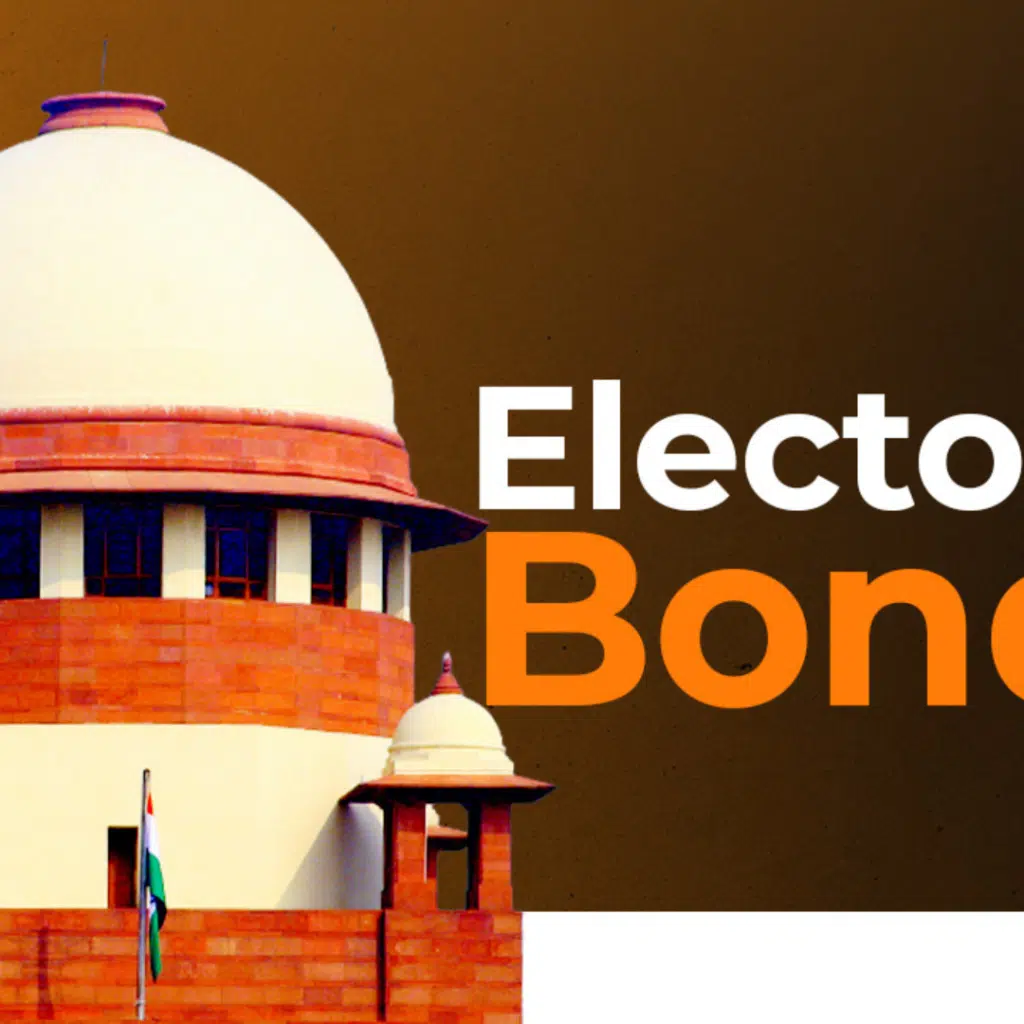
Supreme Court Strikes Down Electoral Bonds Scheme as Unconstitutional: A Landmark Verdict
Table of Contents
The controversial electoral bonds programme was ruled unlawful by the Supreme Court today, a major ruling that has echoed across India’s democratic and political corridors. The decision ends a protracted discussion about the scheme’s legality and its effects on political fundraising transparency. It was rendered by a five-judge Constitution bench that included Chief Justice of India DY Chandrachud, Justices Sanjiv Khanna, BR Gavai, JB Pardiwala, and Manoj Misra.
Electoral bonds, which were introduced in 2017 by means of the Finance Act, were marketed as a means of guaranteeing that funds entering political party coffers are clean. Donors could make anonymous contributions by using bearer bonds that they could buy from the State Bank of India. The scheme’s anonymity clause, however, sparked serious worries about the possibility of unrestricted, endless funding and the danger of encouraging a culture of reciprocity between political parties and contributors.
The plan was opposed by petitioners who claimed that by hiding the sources of political funding—a vital part of a robust democracy—it infringed against the freedom to information. They also questioned the legitimacy of democratic ideals and legislative process by opposing the Finance Act’s passage as a money measure, which avoided Rajya Sabha approval.
The unanimous ruling of the Court, as expressed in Chief Justice Chandrachud and Justice Sanjiv Khanna’s two opinions, emphasises how crucial political funding transparency is. The judges stressed the need for political parties to function under a system that enables voters to make educated decisions because they are essential players in the democratic process. The decision made clear that, as a fundamental component of participatory democracy, the right to information covers topics beyond state affairs, including information on political fundraising.
Important to the Court’s decision was its acknowledgement that, despite the need of preventing dark money from entering politics, the electoral bonds programme did not pass the “least restrictive means test.” Alternative techniques for guaranteeing clean political money, like electronic transfers and electoral trusts, were judged to be similarly successful but less invasive. The decision also highlighted the need of maintaining one’s political privacy and the dangers of revealing one’s political connections, which might include social exclusion and voter monitoring.
By overturning the electoral bonds programme, the Supreme Court established a precedent that strikes a compromise between the defence of individual rights and the requirement for political financial openness. This ruling serves as a call to action for legislators to create more democratic, open, and accountable systems for handling political contributions in order to prevent the influence of hidden financial interests from tainting the electoral process.
The decision not only upholds the judiciary’s duty to protect constitutional principles, but it also makes it abundantly evident how important transparency is in the political funding system, which is essential to democracy.
In conclusion, the Supreme Court’s ruling on electoral bonds is a turning point for Indian democracy and a shift in the direction of more openness and accountability in political financing. The Court has maintained the fundamental tenets of democracy by ruling the plan unlawful, highlighting the importance of an informed public and the defence of individual rights in the political arena.
FAQs:
- Electoral bonds: what are they?
- Electoral bonds are monetary mechanisms that let contributors give to political parties in secret.
- For what reason were electoral bonds introduced?
- By permitting donations through official banking systems, they were allegedly introduced with the intention of cleaning up political fundraising and lowering the amount of black money that entered politics.
- What was the primary concern of the Supreme Court regarding the electoral bonds scheme?
- The Court expressed worry that voters’ right to knowledge would be violated by the scheme’s anonymity, which would have prevented them from knowing all the facts about the sources of political money.
- What does the ruling signify for India’s political financing system?
- In order to maintain a robust democratic process, the ruling emphasises the necessity for accountability and transparency in the review of political funding arrangements.
Barelaw, an online platform dedicated to delivering comprehensive legal knowledge, proudly presents its exclusive category of case briefs. This section is meticulously crafted to offer insightful analyses of landmark judgments, providing a valuable resource for legal professionals, students, and anyone interested in understanding the intricacies of law. Our case briefs delve deep into pivotal court decisions, exploring the rationale behind each judgment and its impact on the legal landscape.
We understand that navigating the complexities of legal judgments can be challenging. That’s why our case briefs are designed to be both informative and accessible, ensuring that readers gain a clear understanding of the key legal principles involved. Each brief includes a summary of the facts, the legal issue at hand, the court’s reasoning, and the ultimate decision. This structured approach makes it easier for our audience to grasp the nuances of each case.
Our website is a treasure trove of legal wisdom, constantly updated with the latest and most significant cases. Whether you’re a law student seeking to enhance your knowledge, a practicing attorney looking for a quick reference, or simply a curious mind eager to understand the law’s evolution, Barelaw is your go-to destination.
Explore our case briefs and immerse yourself in the world of law. Visit our website now and discover the wealth of legal knowledge at your fingertips. The link is provided below for your convenience and direct access to our expansive legal database
You can access more legal drafts here – https://www.barelaw.in/legal-drafts/



